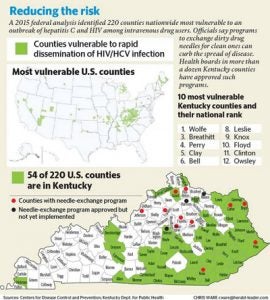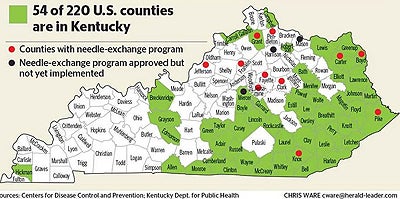Lincoln Board of Health proceeds with syringe exchange program
Published 9:30 am Thursday, January 12, 2017

Stanford City Council pledges support
STANFORD – In December, the Lincoln County Health Board gave the go-ahead to proceed in gathering support for a syringe exchange program that aims to combat risks of infectious disease outbreaks due to intravenous drug use.
Last week, the Stanford City Council was the first to unanimously pledge support of a syringe exchange program, following a discussion of the current risks of infectious disease outbreak and risk to residents who could come across a dirty needle.
“As you all know, Kentucky has really been impacted by the drug epidemic and the issues beyond addiction, what you call collateral issues, are the dirty needles being used and reused with the extreme risk of hepatitis c, hepatitis b and HIV, which can be really deadly,” Councilman and health board member Naren James said during the Jan. 5 meeting.
During the last legislative session, the Kentucky General Assembly made the “local option” possible, meaning municipalities can choose to implement needle exchange programs, with support from the local city council and county fiscal court, James explained.
“We really feel this is really defensible because of the fact that there are so many people at risk for HIV and hepatitis,” he said.
James said this is not going to be a program where people can just “come give a needle and we give you a new one.”
“We are going to offer counseling,” he said.
Council member Peggy Hester asked if counseling could be made mandatory to which James answered that the health board still has to work out the details of the program.
Gathering support is the first step, he said.
City Attorney Christopher Reed shared a personal experience he had witnessing dirty, bloody needles in the Wayne County Courthouse parking lot and again in a Danville parking lot.
“There was a Ziplock bag full of needles that were full of blood,” he said. “Two days after that, I went to a restaurant in Danville and got out of my car in flip flops and almost stepped on a needle that had blood in it.”
The exchange takes those dirty needles off the street so children can’t step on them in parking lots or find them in other places, Reed said.
Reed also spoke on the cost of treating such infectious diseases, which affects the wallets of taxpayers.
“The average treatment for someone with hepatitis C is about $80,000 a year, according to the CDC,” Reed said. “With state-paid healthcare, that’s taxpayers paying that. That’s on the backs of the citizens of Lincoln County and the Commonwealth in general.”
Reed said 11 counties in the state have needle exchange programs in place right now.
“In Pike County, last month, they had 23 people sign up last month for the needle exchange program and four of them stopped using and went to rehab after about two weeks of coming in there,” he said. “It has an effect. It’s not going to be an immediate one, but it works.”
The drug epidemic hits close to home for Reed, he told the council, as a friend of his was found dead in her bathtub after overdosing on heroin.
“It’s a real problem in Lincoln County and Lincoln County is right on the border,” he said. “It cuts down on serious diseases that are affecting the region. It’s a good program.”
A report from the U.S. Center for Disease Control and Prevention (CDC) released in July last year, ranked Lincoln County 97 out of 220 counties in the nation identified as being most vulnerable to outbreaks of HIV and hepatitis C.
Lincoln County Health Department Director Diane Miller said then that drug use and abuse contributed to some of the increase in hepatitis C cases in the county but that she had not seen a substantial increase in the number of HIV cases.
That’s not to say they don’t exist though, according to many advocates of needle exchange programs who believe the programs bring in people who might not otherwise come in for testing.
Testing for infectious diseases is a component of most syringe exchanges that have been put in place in the state.
The Stanford council unanimously approved a resolution supporting the creation of a syringe exchange in Lincoln County.
According to minutes from the health board’s Dec. 13 meeting, the Lincoln County Health Board plans to invite Kath Crown-Weber, director of the Mercer County Health Department, to the board’s Feb. 21 meeting to discuss the county’s needle exchange program.
Miller also plans to provide guidelines and an estimated cost of implementing a needle exchange in Lincoln County during the February meeting.
Letters were drafted to send to the city council and Lincoln County Fiscal Court and if support is given from the fiscal court, the health board will move forward on the details of the program.
In other business, the council:
• appointed Jim Jarrett to the Planning and Zoning Commission.
• appointed Danny Lynn to the Board of Adjustments.
• appointed Naren James and Ted Defosset to the Lincoln County Ambulance Board.
• passed second readings of four updated ordinances regarding LED and illuminated signs in the Historic District, Residential Zones, Neighborhood Business Zones and Federal Scenic Highway Zone.




